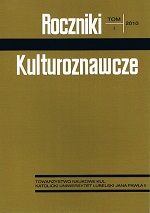Problem estetyczny i moralny teatru w pismach św. Augustyna
Aesthetic and Moral Issue of the Theatre in the Writings of St. Augustine
Author(s): Augustyn EckmannSubject(s): Cultural Essay, Political Essay, Societal Essay
Published by: Towarzystwo Naukowe KUL & Katolicki Uniwersytet Lubelski Jana Pawła II
Keywords: Augustine; theatre; aesthetic issue; moral problem; katharsis; mime; pantomime; pagan cult
Summary/Abstract: An analysis of texts indicates that in the mind of the author of the writings, the moral question the theatre poses is closely related to the issue of aesthetics. The evil the theater causes is explained by seducing pleasure, experienced as a result of touching scene, which disturbs the heart and weakens the will, leaving it defenseless against a sudden return of awakening instinct. The emotion comes from the desire of crying and human brotherhood. The Bishop of Hippo condemns the ancient theatre of his times for three main reasons: theological, moral and social. Theologically, the theatre seems to him to be a Devil’s playground and a morbid manifestation of an evil spirit. Morally, the theatre is a school of corruption. Socially, Augustine complains that the theater diverts the sight of people from the difficult real situation in the country, by a presentation of imaginary woes. We see in the Augustinian demonstration a great power of expression and an ability of psychological impact.
Journal: Roczniki Kulturoznawcze
- Issue Year: 2010
- Issue No: 1
- Page Range: 135-146
- Page Count: 12
- Language: Polish

